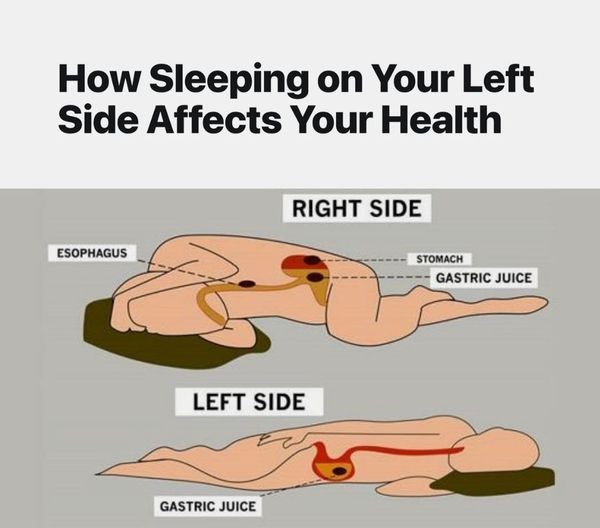Most people don’t spend much time thinking about how they sleep. You crawl into bed, roll into whatever position feels comfortable, and call it a night. But the position you choose can quietly influence everything from digestion to cardiovascular health. And among all the possible sleeping positions, there’s one that keeps coming up in research and traditional medical practice: sleeping on your left side.

It sounds oddly specific, but left-side sleeping has a stack of potential benefits tied to anatomy, gravity, and the way your organs are arranged inside your body. None of this requires you to overhaul your entire sleep routine. It’s simply about being aware that a small habit — turning onto your left side — can support some major systems in your body while you rest.
Let’s break down what actually happens when you sleep this way, why it matters, and who should consider making the switch.
The first big win goes to your heart. The left side of your heart pumps blood out to the rest of your body, and while it’s perfectly capable of doing the job in any position, sleeping on your left side takes a bit of pressure off the cardiovascular system. Gravity helps the aorta — the main artery that carries blood away from the heart — extend downward naturally, rather than having to curve awkwardly as it does when you lie on your right side. The inferior vena cava, the large vein that brings blood back to the heart, also runs along the right side of your spine. When you sleep on your left side, you’re not compressing it. It’s a subtle shift, but over hours of sleep, it gives the heart an easier path to do what it’s designed to do.
This position is especially helpful for pregnant women, who often struggle to find comfort as the pregnancy progresses. In late pregnancy, the weight of the uterus can press against major blood vessels, particularly when lying on the back or right side. Left-side sleeping relieves that pressure. It improves blood flow to the heart, placenta, and kidneys, helping both mother and baby. It also reduces strain on the liver, which sits on the right side of the abdomen. A less-compressed liver can do its job more efficiently — filtering blood, processing nutrients, and managing toxins. Doctors regularly recommend the left side as the safest and most comfortable sleep position for pregnancy, especially in the third trimester.
But this isn’t only about heart health or pregnancy. Your lymphatic system — the lesser-known cousin of your circulatory system — also benefits. The lymphatic system’s job is to move waste products, toxins, and excess fluids out of your tissues and back into your bloodstream so the body can get rid of them. Most of this drainage happens through the thoracic duct, which sits on the left side of the body. When you sleep on your left, gravity assists lymph fluid in flowing toward that duct instead of fighting against an uphill path. It’s a quiet little boost for one of the body’s most important detox pathways. On top of that, proteins that leak into tissues during the day are more easily picked up and transported back into circulation from this position.
Sleeping on your left side also keeps your liver — one of the hardest-working organs you have — functioning more comfortably. The liver is heavy, located on the right side, and naturally shifts downward when you lie on your right. This can put stress on the liver or make it work slightly harder. Sleeping on your left allows it to rest in a more neutral position, helping it process toxins, medications, hormones, and metabolic waste without unnecessary strain.
Your spleen benefits too. This fist-sized organ sits under the rib cage on your left side and plays a major role in immune function, blood filtration, and fighting infections. When you sleep on your left side, gravity promotes easier blood flow into the spleen, allowing it to more effectively filter old blood cells and foreign material. Better flow means better filtration, which means better immune support.
One of the most immediate and noticeable benefits of left-side sleeping is relief from nighttime heartburn or acid reflux. If you deal with gastroesophageal reflux disease (GERD), you’ve probably experienced that burning sensation that gets worse when you lie down. Left-side sleeping helps because it positions your stomach below the junction where the esophagus meets the stomach. This prevents stomach acid from sneaking upward. Lying on your right side has the opposite effect — it actually makes reflux more likely, because the stomach then sits higher than that valve. For many people, simply turning to the left is enough to eliminate nighttime reflux entirely.
Digestion as a whole also runs more smoothly in this position. The connection between the small intestine and large intestine — the ileocecal valve — sits on the right side. When you sleep on your left, gravity helps waste move from the small intestine into the large intestine more easily, which is the direction it’s supposed to go anyway. This can reduce bloating, minimize gas, and promote more regular bowel movements. It’s not magic; it’s just anatomy working the way it’s meant to.
Of course, no single sleep position is perfect for everyone. People with certain heart conditions, shoulder injuries, or chronic pain might prefer a different angle. And some folks simply can’t stay in one position all night. That’s normal. Sleep isn’t meant to be rigid. The goal isn’t to force your body to sleep a certain way — it’s to understand which choices support your health and why they do.
If you want to try sleeping on your left side, make it easy on yourself. Put a pillow behind your back so you’re less likely to roll onto your right during the night. Place another pillow between your knees to align your spine and reduce pressure on your hips. Choose a firm pillow that keeps your neck at a natural angle without tilting too far up or down. Small adjustments like these make left-side sleeping more comfortable and sustainable.
It might feel strange at first, especially if you’re used to sleeping on your back or stomach, but your body adapts quickly. And the benefits — from smoother digestion to less heartburn, improved circulation, better lymph flow, and reduced organ strain — are worth giving it a fair shot.
You shouldn’t expect your life to change overnight just because you roll to the left. But it’s one of those quiet, consistent habits that support your body in the background. No supplements, no gadgets, no cost — just gravity and good positioning doing what they naturally do.
If you’re curious, try it tonight. You might be surprised by how much better you feel in the morning.



